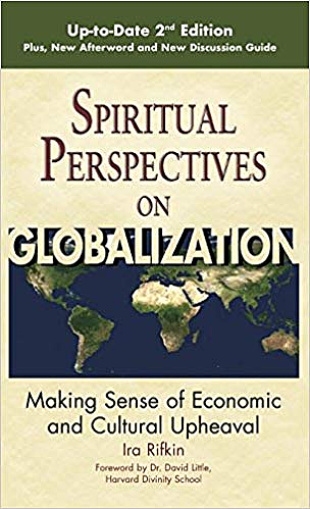Diana L. Eck has written: "We cannot live in a world in which our economies and markets are global, our political awareness is global, our business relationships take us to every continent, and the Internet connects us with colleagues half a world away and yet live on Friday, or Saturday, or Sunday with ideas of God that are essentially provincial, imagining that somehow the one we call God has been primarily concerned with us and our tribe." Clearly the time has come for religious and spiritual communities to wake up to the reality of globalization, a term that covers the complex and turbulent economic and cultural changes that are rocking our world from top to bottom.
This excellent book by Ira Rifkin (editor of Spiritual Innovators: Seventy-Five Extraordinary People Who Changed the World in the Past Century) is the first in a new series from Skylight Paths that will focus on how spiritual beliefs can inform our opinions and transform our actions in areas of social justice and societal change. Here are perspectives on globalization from eight world religions: Bahá'ís, Buddhists, Protestants, Catholics, Earth-based religions and neo-pagans, Hindus, Jews, and Muslims. The intention is to provide an accessible and open-ended overview of the subject and not to peddle one perspective or opinion over another.
While some Protestants, Catholics, and Bahá'ís are convinced that globalization can bring humanity together and improve the condition of the world's poor, many within the Jewish, Hindu, and Buddhist traditions point out the negative spin-offs from globalization — widening the gap between the rich and the poor, increasing destruction of the environment, setting in place a neo-colonialism of the West, violating human rights, and creating unemployment. The neo-pagans and the Earth cherishing tribal peoples are most concerned about the dire effects of short-term thinking where profits matter more than the well-being of future generations.
Many religious people, realizing that their voices must be heard, have joined the movement for social justice. It is refreshing to see spiritual politics come alive in our times: meditation and prayer cannot be separated from the complicated issues of the day. Savvy study groups within religious communities should use this resource as the launch pad for discussion of globalization, which affects the way all of us live, work, and relax.
